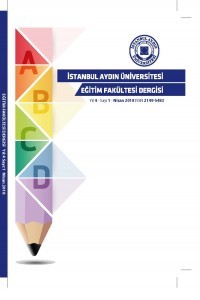Pakistanlı Öğrencilerin İngilizce Öğrenme ve Konuşma Konusundaki Görüşleri
Pakistan’da İngilizce hem eğitim dili olarak hem de resmi dil olarak kullanıldığından önemli bir yere sahiptir. Pakistan’daki dil, eğitim ve kültür çeşitliliği insanların belirli bir grup veya dil ile özdeşleşmesini zorlaştırmaktadır. Öğrencilerin iç görülerini anlamak için onların dil algı ve tercihlerini incelemek çok önemlidir, çünkü böyle bir inceleme Pakistan’daki eğitim sistemlerine bir değişiklik getirebilir. Bu bağlamda, bu çalışmanın amacı öğrencilerin İngilizceyi öğrenme ve konuşma konusundaki görüşlerini araştırmak ve böylece onların bu konuda olumlu veya olumsuz tutumlarını ortaya çıkarmaktır. Bu araştırma karma yöntemli bir çalışma olarak tasarlanmış ve 2019-2020 akademik yılında Forman Christian College, Lahor / Pakistan’da öğrenim görmekte olan 60 lisans öğrencisi ile yürütülmüştür. Araştırma sorularının cevaplarını bulabilmek için hem nitel ve hem de nicel araştırma teknikleri kullanılmıştır. Çalışmanın nitel verileri öğrenci anketi yoluyla nicel verileri ise izlem görüşmeleriyle toplanmıştır.
Anahtar Kelimeler:
İngilizce öğrenmek, İngilizce konuşmak, Öğrenci görüşleri
Pakistani Students’ Perspectives on Learning and Speaking English
In Pakistan English is used as an official language and has a significant
position in the educational system. The intricate lingual, educational,
and cultural diversification in Pakistan, might make it difficult for
people to identify with a particular group and language. In this sense, it
is fundamental to examine the learner’s perceptions together with their
language preferences in order to understand their insights; this can,
in return bring about a change in the educational systems running in
Pakistan. Following this line of argument, the purpose of this study was
to investigate the students’ perspectives towards learning and speaking
English and to better understand whether the students account positive or
negative attitudes towards learning and speaking English. The study was
conducted with 60 undergraduate students studying at Forman Christian
College, Lahore/Pakistan. This study was designed as a mixed method
study. That is, both quantitative and qualitative research methods were
used to find out the answers to the research questions. The quantitative
data was collected through a questionnaire and the qualitative data was
collected through interviews.
Keywords:
Learning English, Speaking English, Student perceptions,
___
- Canagarajah, A. S. (1999). Resisting linguistic imperialism in English teaching. Oxford: Oxford University Press. Dörnyei, Z. (2005). The psychology of the language learner: individual differences in second language acquisition. New Jersey: Lawrence Erlbaum Associates. Horwitz, E., Horwitz, M., & Cope, J. (1986). Foreign Language Classroom Anxiety. In Modern Language Journal, 70 (2), pp. 125–132. Kramsch, C. (1998). Language and culture. Oxford: Oxford University Press. Language, identity, and the ownership of English. In TESOL Quarterly. (3rd ed.,) Vol. 31, pp. 409–429. Norton, B. (2000). Identity and language learning: gender, ethnicity and educational change. New York: Pearson ESL. Rahman, T. (n.d.). Language and politics in Pakistan. Oxford: Oxford University Press. Soomro, N. H. (2016). Towards an understanding of Pakistani undergraduates’ current attitudes towards learning and speaking English. Unpublished PhD thesis. University of Glasgow. Thirumalai, M. S. (2002). An introduction to TESOL: Teaching English to Speakers of others Languages. In Language in India (2nd ed.,). Vol. 2.
- ISSN: 2149-5483
- Yayın Aralığı: Yılda 2 Sayı
- Başlangıç: 2015
- Yayıncı: İstanbul Aydın Üniversitesi
Sayıdaki Diğer Makaleler
Söylem-Biliş İlişkileri Bağlamında Çocuklar İçin Felsefe: Söylem Analizi Yaklaşımı
Metin ÇIRPAN, Osman SABUNCUOĞLU
İngilizce Öğrenen Suriyeli Öğrencilerin Kullandığı Dil Bilgisi Öğrenme Stratejileri
Abdullah Mohammad Fawzı DIAB, Hülya YUMRU
Sosyal Yapılandırmacı Hareket Yoluyla Özerk Öğrenmenin Gelişim
Samira HAMMOODİ, Akbar Rahimi ALİSHAH
Örgün ve Yaygın Eğitimi Destekleme ve Yetiştirme Kurslarına Yönelik Öğretmen ve Öğrenci Görüşleri
Pakistanlı Öğrencilerin İngilizce Öğrenme ve Konuşma Konusundaki Görüşleri
